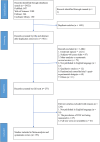The global prevalence of and risk factors for fear of falling among older adults: a systematic review and meta-analysis
- PMID: 38580924
- PMCID: PMC10998426
- DOI: 10.1186/s12877-024-04882-w
The global prevalence of and risk factors for fear of falling among older adults: a systematic review and meta-analysis
Abstract
Background: As a common psychological problem among older adults, fear of falling was found to have a wide range prevalence in different studies. However, the global prevalence of it was unknown and a lack of the large sample confirmed its risk factors.
Objectives: To report the global prevalence of fear of falling and to explore its risk factors among older adults for further developing precise interventions to systematically manage FOF.
Design: A systematic review and meta-analysis was conducted by PRISMA guidelines.
Methods: Searches were conducted in PubMed, Web of Science, EMBASE, the Cochrane Library and the manual search in August 20, 2022, updated to September 2, 2023. Observational studies published in English were included and two researchers independently screened and extracted the data. Fixed or random effects mode was used to estimate the pooled prevalence of and risk factors for fear of falling. Heterogeneity resources were analyzed by subgroup and sensitivity analysis. Publication bias was assessed through funnel plots, Egger's test and Begg's test.
Results: A total of the 153 studies with 200,033 participants from 38 countries worldwide were identified. The global prevalence of fear of falling was 49.60%, ranging from 6.96-90.34%. Subgroup analysis found the estimates pooled prevalence of it was higher in developing countries (53.40%) than in developed countries (46.7%), and higher in patients (52.20%) than in community residents (48.40%). In addition, twenty-eight risk factors were found a significant associations with fear of falling, mainly including demographic characteristics, physical function, chronic diseases and mental problems.
Conclusion: The global prevalence of FOF was high, especially in developing countries and in patients. Demographic characteristics, Physical function, chronic diseases and mental problems were a significant association with FOF. Policy-makers, health care providers and government officials should comprehensively evaluate these risk factors and formulate precise intervention measures to reduce FOF.
Trial registration: The study was registered in the International Database of Prospectively Registered Systematic Reviews (PROSPERO): CRD42022358031.
Keywords: Accidental Falls; Fear of falling; Geriatric nursing; Older adults; Psychological nursing.
© 2024. The Author(s).
Conflict of interest statement
The authors declare no competing interests.
Figures
References
Publication types
MeSH terms
LinkOut - more resources
Full Text Sources
Medical
Research Materials




